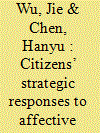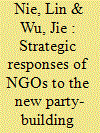|
|
|
Sort Order |
|
|
|
Items / Page
|
|
|
|
|
|
|
| Srl | Item |
| 1 |
ID:
193188


|
|
|
|
|
| Summary/Abstract |
Previous studies on affective governance (情感治理) emphasize how the state has regulated and manipulated citizens’ emotions and psychology. This article, however, shows a different political landscape in which citizens employ emotional strategies to persuade and bargain with the government. Drawing on intensive fieldwork conducted in China from 2019 to 2020, we find that citizens deploy targeted emotional strategies to advance specific interests such as building reciprocal relations with the government, arousing political elites’ empathy, or addressing their most urgent needs. We argue that the government’s deliberate use of affective governance has, on the one hand, unexpectedly revealed and reinforced the conflict between the positive emotions that the state has attempted to exhibit and citizens’ daily experiences and, on the other hand, increased positive feelings towards the government’s efficacy in addressing citizens’ grievances. Taking rare disease patient groups as an example, this article maps and compares three main emotional strategies adopted by civil society in China, namely gratefulness, sadfishing, and dissent. By deciphering these emotional strategies, this article helps us understand the emotional synergy between state and society and sheds new light on the governance of China.
|
|
|
|
|
|
|
|
|
|
|
|
|
|
|
|
| 2 |
ID:
109627


|
|
|
|
|
| Publication |
2011.
|
| Summary/Abstract |
With rapid economic growth and industrial expansion, China consumes more coal than any other nation. Therefore, it is particularly crucial to forecast China's coal production to help managers make strategic decisions concerning China's policies intended to reduce carbon emissions and concerning the country's future needs for domestic and imported coal. Such decisions, which must consider results from forecasts, will have important national and international effects. This article proposes three improved forecasting models based on grey systems theory: the Discrete Grey Model (DGM), the Rolling DGM (RDGM), and the p value RDGM. We use the statistical data of coal production in China from 1949 to 2005 to validate the effectiveness of these improved models to forecast the data from 2006 to 2010. The performance of the models demonstrates that the p value RDGM has the best forecasting behaviour over this historical time period. Furthermore, this paper forecasts coal production from 2011 to 2015 and suggests some policies for reducing carbon and other emissions that accompany the rise in forecasted coal production.
|
|
|
|
|
|
|
|
|
|
|
|
|
|
|
|
| 3 |
ID:
149942


|
|
|
|
|
| Summary/Abstract |
The renewable energy targets put forward by the Chinese government need comprehensive incentive schemes. This paper uses a multi-regional CGE model to evaluate two types of renewable support schemes; a subsidy scheme like a feed-in tariff (FIT) with a direct price impact for final consumers and a subsidy scheme without any price impact. We assess the CO2 consequences of both approaches, as well as their impact on economic activity in terms of GDP, industrial structure, electricity generation structure, and regional final demand elasticities of electricity. We find that a support scheme with price impact is much more effective in reducing CO2 emissions while the difference in GDP between the two policies is small. We estimate that the price implications of the support scheme allow for an additional emissions reduction of 113 Mt CO2—or 0.07% of total emissions—in China during 2020–2035. The support scheme with a price impact does not lead to a negative impact on the Chinese economy although there are significant differences among regions. In addition, while the whole country faces an approximately unitary electricity elasticity demand, we find significant differences in electricity demand elasticities among Chinese regions.
|
|
|
|
|
|
|
|
|
|
|
|
|
|
|
|
| 4 |
ID:
147431


|
|
|
|
|
| Summary/Abstract |
As the country with the greatest energy consumption and CO2 emissions globally, China has commenced preparations for a nationwide carbon market, to be established during the period 2016–2020. Given the spatial heterogeneity of economic development across different regions, the nationwide market will have differing impacts on China's regional economies. The present paper uses a multi-regional CGE model to examine the effects of a nationwide carbon market on regional economies and CO2 reduction efficiency under different emission reduction targets. The results indicate that such a market can effectively reduce costs across the whole society, improving welfare and allocation efficiency of production factors and so reducing regional economic disparities and promoting coordinated regional development. These measures can help China to achieve more ambitious reduction targets with the same abatement costs, and large-scale inter-regional transfer of funds during emissions trading can be invested in CO2 mitigation technologies in economically backward regions, promoting CO2 reduction efficiency and industrial upgrading.
|
|
|
|
|
|
|
|
|
|
|
|
|
|
|
|
| 5 |
ID:
184087


|
|
|
|
|
| Summary/Abstract |
Over the last decade, the Chinese Communist Party (CCP) has sought to assimilate the third sector – non-governmental organizations (NGOs) – through its party-building campaign. This article examines NGOs’ strategies in response to this campaign, based on in-depth interviews with 64 NGOs and local cadres. We find that NGOs have developed three main strategies to respond to the CCP’s attempts to penetrate their organizations. First, NGOs embedded in the party-state system and those affiliated with private enterprises tend to acquiesce to party building out of habit and for compliance reasons, respectively. Second, those with multiple stakeholders generally compromise in the party-building process, acting as passive compliers if they depend more on non-state resources, or active players if they rely more on state resources. Third, civic NGOs that advocate causes inconsistent with the ruling regime might avoid party building as a resistant strategy, by either disguising their nonconformity or escaping from the control of the ruling regime entirely. NGOs’ strategic responses are contingent on their negotiating power, which results from their resource dependence and the party’s enforcement dilemmas. This article contributes to our understanding of the recent party-building campaign from an institutional perspective, and enriches our knowledge about relations between the party and the third sector.
|
|
|
|
|
|
|
|
|
|
|
|
|
|
|
|
| 6 |
ID:
183800


|
|
|
|
|
| Summary/Abstract |
How do international norms diffuse in culturally heterogeneous and politically conservative environments? This article examines the norm adaptation strategies of international nongovernmental organizations (INGOs) in China. Through in-depth interviews with INGO representatives operating in the HIV/AIDS, LGBT, labor, animal rights, and gender-related fields in China, we find that INGOs have developed various norm adaptation strategies in response to local social and political barriers. First, INGOs working with new or low-consensus norms would strategically disregard those norms by not mentioning them during operation to avoid resistance from domestic society. Second, INGOs advocating norms that are inconsistent with the regime often adopt a norm containment approach, limiting the norm's degree and scope in exchange for operating space to achieve domestic compliance and meet international expectations. Third, INGOs advocating norms consistent with the ruling regime might adopt a norm signaling approach to obtain authorities' recognition and government support. This article contributes to our understanding of the recent Overseas NGOs Law and its influence on INGOs' transnational advocacy work in China, and enriches our knowledge of the dynamic norm adaptation process.
|
|
|
|
|
|
|
|
|
|
|
|
|
|
|
|
|
|
|
|
|